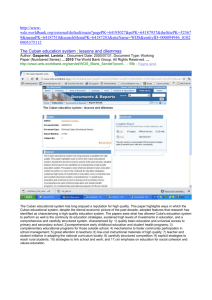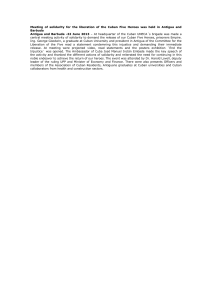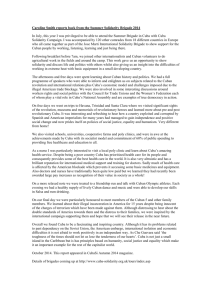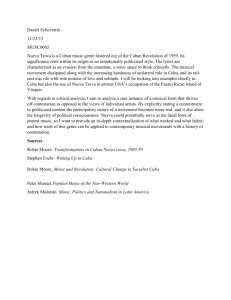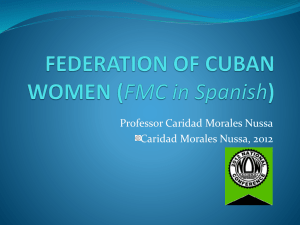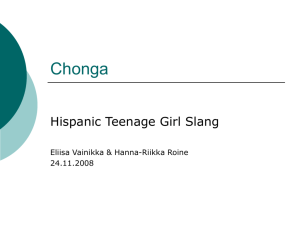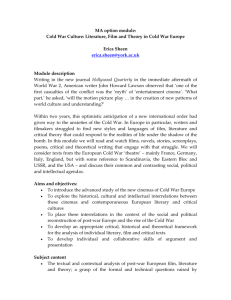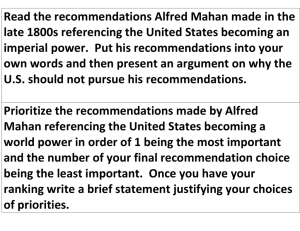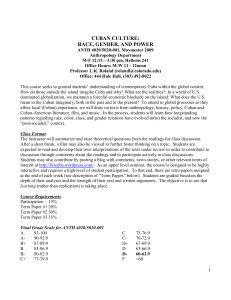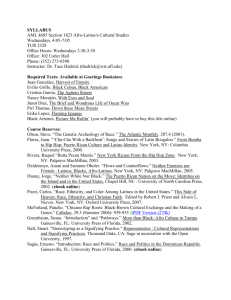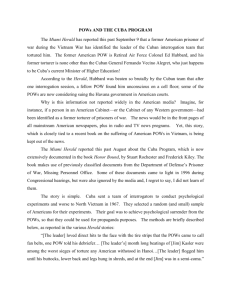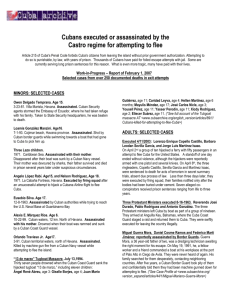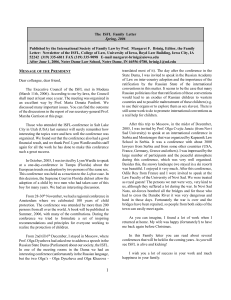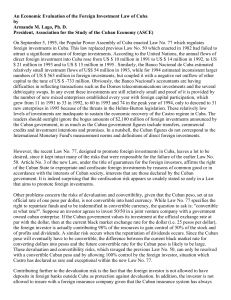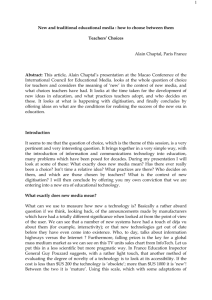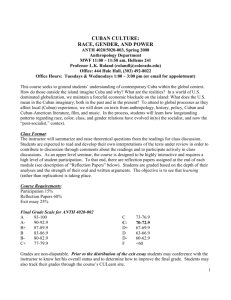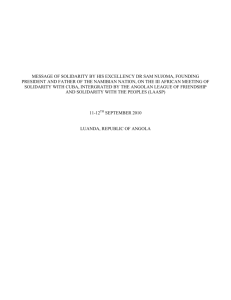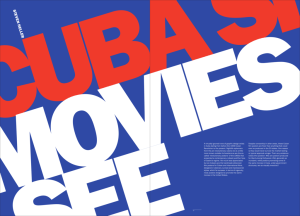MODULE SPECIFICATION TEMPLATE
advertisement
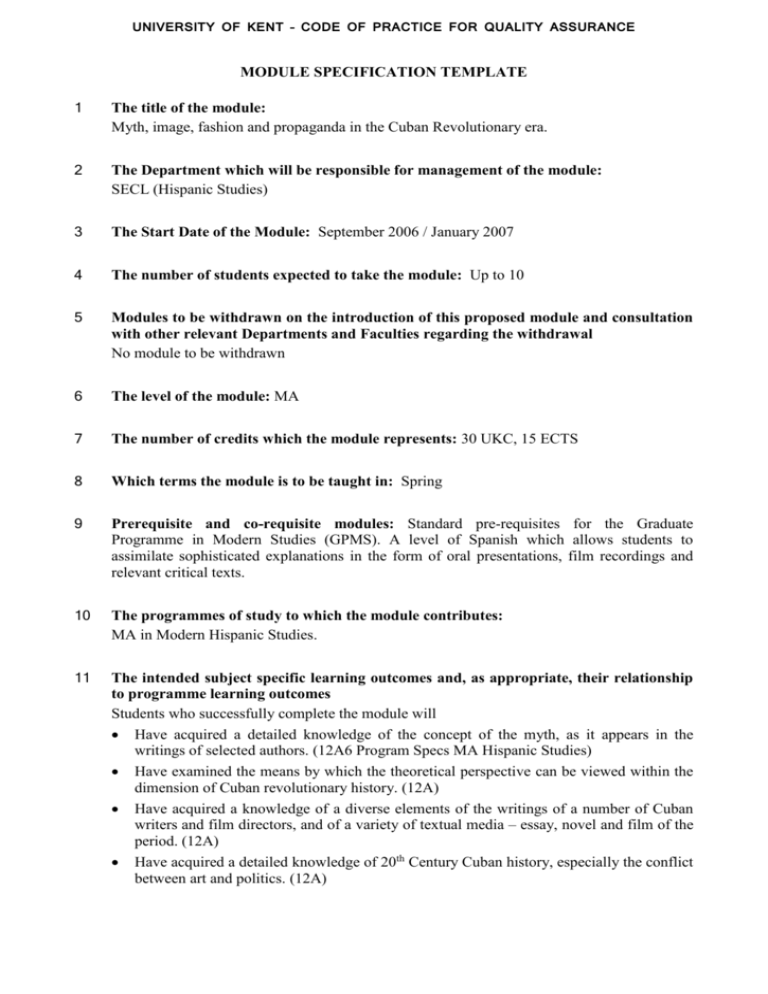
UNIVERSITY OF KENT – CODE OF PRACTICE FOR QUALITY ASSURANCE MODULE SPECIFICATION TEMPLATE 1 The title of the module: Myth, image, fashion and propaganda in the Cuban Revolutionary era. 2 The Department which will be responsible for management of the module: SECL (Hispanic Studies) 3 The Start Date of the Module: September 2006 / January 2007 4 The number of students expected to take the module: Up to 10 5 Modules to be withdrawn on the introduction of this proposed module and consultation with other relevant Departments and Faculties regarding the withdrawal No module to be withdrawn 6 The level of the module: MA 7 The number of credits which the module represents: 30 UKC, 15 ECTS 8 Which terms the module is to be taught in: Spring 9 Prerequisite and co-requisite modules: Standard pre-requisites for the Graduate Programme in Modern Studies (GPMS). A level of Spanish which allows students to assimilate sophisticated explanations in the form of oral presentations, film recordings and relevant critical texts. 10 The programmes of study to which the module contributes: MA in Modern Hispanic Studies. 11 The intended subject specific learning outcomes and, as appropriate, their relationship to programme learning outcomes Students who successfully complete the module will Have acquired a detailed knowledge of the concept of the myth, as it appears in the writings of selected authors. (12A6 Program Specs MA Hispanic Studies) Have examined the means by which the theoretical perspective can be viewed within the dimension of Cuban revolutionary history. (12A) Have acquired a knowledge of a diverse elements of the writings of a number of Cuban writers and film directors, and of a variety of textual media – essay, novel and film of the period. (12A) Have acquired a detailed knowledge of 20th Century Cuban history, especially the conflict between art and politics. (12A) UNIVERSITY OF KENT – CODE OF PRACTICE FOR QUALITY ASSURANCE 12 The intended generic learning outcomes and, as appropriate, their relationship to programme learning outcomes: Students who successfully complete the module will have improved their ability to: Participate in discussion, make their own contributions to the discussion and listen to and respect the contributions of others; (12B) Have improved their ability to research, plan and present orally to the group a chosen topic. (12B) Have improved their ability to plan and write an essay and to organise it around a coherent argument. (12B6) Have improved their ability to analyse, criticise and assess logical arguments. (12B4) Communicate their own ideas clearly and coherently, orally and in writing; (12B5) Reflect on their own learning, plan their use of time, and identify appropriate directions for further study. (12B6) 13 A synopsis of the curriculum: What do we understand by the term ‘myth’? How can the various theoretical definitions of the term be applied to modern Cuba, in relation to image projected from Cuba to the outside world, and the image projected upon Cuba? How do the inevitable forces of politics, history and conflict in Cuban literature and film relate to theoretical models of myth and mytholigisation? Are the figures of, for example, Che Guevara and José Martí, elements of the creative poetic myth explored by Lezama Lima, the secular ‘canonisation’ explored by Lévi-Strauss, or the ‘ideological abuse’ of Roland Barthes? This module examines a variety of textual media created during the Cuban revolution era, and explores the degree to which the texts employ the persuasive language of rhetoric in the creation of mythical ‘truths’ concerning the revolutionary history. 14 Indicative Reading List: Herbert Matthews – The Cuban Story – (George Braziller Publishers, New York, 1969) Guillermo Cabrera Infante – Tres tristes tigres – (Editorial Seix Barral, 2001) Guillermo Cabrera Infante – Mea Cuba – (Ediciones Alfaguara, 1999) Abel Posse – Los cuadernos de Praga – (Random House Mondadori, Barcelona, 2004) Film – Ya Kuba – dir. Mikhael Kalatozov. 15 Learning and Teaching Methods, including the nature and number of contact hours and the total study hours which will be expected of students, and how these relate to achievement of the intended learning outcomes The module will be taught by means of a weekly two-hour class which will combine lecture and seminar elements. A short introductory presentation (15 to 20 minutes) will set out the key ideas and themes for the week, and will provide basic information about the relevant texts and a framework in which to understand them. These presentations will aim to stimulate discussion and to encourage students’ active participation. Questions for discussion will be posed, both about the interpretation of the texts and about the wider questions which they raise, and students will be encouraged to develop their own views about these questions. The alternation of small-group and large-group discussion will give students confidence to formulate their own ideas and to share them with a larger group. These discussions and presentations will assist the students in the research methodology and provide a forum wherein material to be investigated in the essays will be debated. UNIVERSITY OF KENT – CODE OF PRACTICE FOR QUALITY ASSURANCE 16 Assessment methods and how these relate to testing achievement of the intended learning outcomes Two essays (2500 words each), or one essay (5000 words) 17 Implications for learning resources, including staff, library, IT and space As a new member of staff, the module is based predominantly on my research interest in Cuban literature and culture. All the material not collated in a course booklet is either already available in Templeman Library or shall be purchased for the library with this year’s allocation. Set texts will be ordered for Blackwell bookshop. 18 A statement confirming that, as far as can be reasonably anticipated, the curriculum, learning and teaching methods and forms of assessment do not present any nonjustifiable disadvantage to students with disabilities As far as can be reasonably anticipated, the curriculum, learning and teaching methods and forms of assessment do not present any non-justifiable disadvantage to students with disabilities other than those typical of any course. Statement by the Director of Learning and Teaching: “I confirm I have been consulted on the above module proposal and have given advice on the correct procedures and required content of module proposals”. ................................................................ Director of Learning and Teaching .............................................. Date Statement by the Head of Department: “I confirm that the Department has approved the introduction of the module and will be responsible for its resourcing” ................................................................. Head of Department Revised August 2002; Revision 2 in 2003. .............................................. Date
